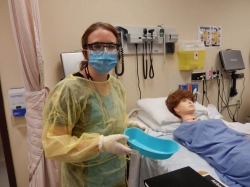Students gown up for infection prevention and control

Fourth-year School of Nursing student Jessica Dawe stood at her patient's bedside and explained why she was wearing goggles, a mask, gloves and a mid-length yellow hospital gown.
It was the afternoon practice session for Ms. Dawe who, along with her fourth-year classmates, spent a full-day recently in a workshop about infection prevention and control. The session also included review of practical skills such as putting on, wearing and removing personal protective equipment (PPE.)
"So don't be intimidated when we come in to see you dressed like this," she told the curly-haired mannequin who lay quietly in a hospital bed in the School of Nursing's Learning Resource Centre (LRC).
Ms. Dawe and two fellow nursing students on her care team spoke reassuringly to their patient, who had just been put on contact precautions because of concern that his condition might be contagious. These precautions would help keep him safe and prevent potential infection from spreading to visiting family members, other patients and staff, they explained.
While the situation was only a practice scenario based on real-life case studies, fourth year students were glad for the experience and embraced their roles!
With influenza season just beginning and other infectious diseases such as Ebola grabbing headlines world-wide, the sessions were timely. It was a chance to review and put into practice what they had been learning since first year.
Students took part in group discussions and looked at practical application of Routine Practices and Additional Precautions, the set of guidelines that forms the basis for the Canadian system of infection prevention and control.
Faculty who teach clinical courses facilitated the sessions. They helped students identify appropriate and additional inflectional control precautions needed when caring for patients with influenza-like illnesses and other common infections, and observed students to make sure they could properly put on and remove protective equipment.
"Students told us that the day's activities were a confidence booster," said Dr. April Manuel, one of several faculty members involved in the workshop. "They feel good about their ability to make decisions around the kind of precautions needed for managing infectious diseases."
For students the day was also an opportunity to refine their knowledge and skills by reinforcing principles and applying them in new situations.
"We had a chance to analyze case studies, act out scenarios to see what we would do in different situations, talk to our instructors and get their advice," said nursing student Emilee Downey. "It's good to know that we have the knowledge and skills we need to protect ourselves and our patients."
"It was encouraging to see that students had a strong foundation of knowledge, and were able to apply it in a novel situation," said Dr. Sandra MacDonald. "The mock simulation confirmed that our students are prepared to implement infection control practices needed to protect their patients and themselves from the spread of common infectious diseases."
The day-long activity was led by Dr. Donna Moralejo, the SON's associate dean (graduate studies) and an expert in infection control.
Dr. Moralejo has a background in nursing, epidemiology and microbiology and played a key role in the development of infection prevention and control guidelines at the national and provincial level. Recently she was elected to the board of trustees of the International Federation of Infection Control.
"Nurses and nursing students may never see a case of Ebola, but they will care for many patients who have influenza and other infections," said Dr. Moralejo. "Infection prevention and control is not just about Ebola, H1N1, or SARS, it's about our everyday routine practices. It's about making sure our students understand the principles of infection prevention and control, and can apply them in a variety of situations.
"Understanding the principles is what will help prepare them for a novel or crisis situation."